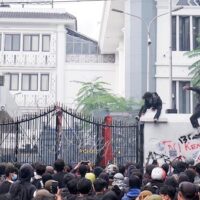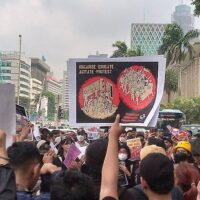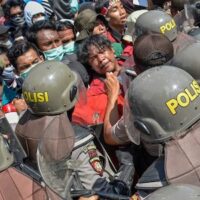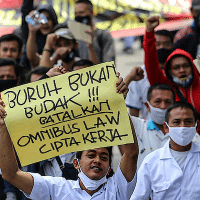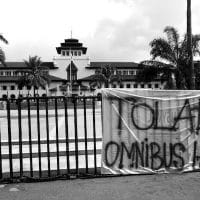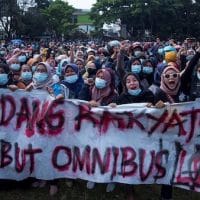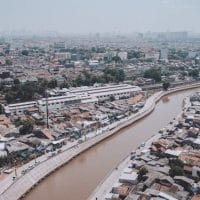-
Conservation Innovations: How sustained resistance is saving one of the Earth’s most critical rainforests from corporate greed
As profit-driven exploitation imperils Indonesia’s Leuser Ecosystem, some unique conservation strategies are working to save it.
-
The Indonesian People’s Movement need to build a political party
The 1998 reform movement (reformasi) that successfully overthrew former president Suharto did not automatically change the political-economic power structure in Indonesia. The political system that was promised to be more democratic was still controlled by the old elite and the owners of capital.
-
Activists warn of the growing militarisation of the Indonesian government under General Prawobo
Interview with Activist M. on the growing military influences on civil life threatening Indonesia’s dearly earned peace.
-
Students protest continue in Indonesia
Over the last several weeks, demonstrations have erupted across Indonesia.
-
Halt Indonesia’s slide into military dictatorship
Repeal the authoritarian TNI law before it’s too late!
-
A master of terror
The murky background of the likely next President of Indonesia may come to haunt Indonesia, and Australia.
-
Politics of hedging in the Indo-Pacific
New Zealand’s estimation matters because it is a small country in Southern Pacific heavily dependent on trade with China for preserving its prosperity and yet one of the Five Eyes (along with the U.S., UK, Australia and Canada), the exclusive secretive security grouping of Anglo-Saxon countries.
-
Indonesia launches national payment system to replace VISA, MasterCard
Dicky Kartikoyono the Head of Strategic Management and Governance Department of the Central Bank, says that Indonesia will launch its very own national payments system to be used in state-owned institutions and enterprises.
-
Indonesia’s new criminal code: An attack on human rights and marxism
In early December, last year, the Indonesian government legislated a new criminal code to replace the old code that the country inherited from its past colonial oppressor, the Dutch. The government has claimed that the legislation of the new criminal code was an effort to “decolonize” Indonesia’s criminal justice system from the legacy of the Dutch East Indies colonial era.
-
Listen to Barack Obama’s chilling description of U.S. involvement in the gigantic 1965 Indonesia massacre
This week, Indonesian President Joko Widodo acknowledged the “staggering mass slaughter” that took place 57 years ago.
-
Twenty-two years of austerity in Timor-Leste: The IMF and rebuilding the neoliberal state from scratch
Timor-Leste was proclaimed by the Revolutionary Front for an Independent East Timor (FRETILIN) as a sovereign state on November 28, 1975.
-
Indonesia, not the EU, needs to make its palm oil sustainable
Importers must step up support for sustainable palm oil, and producers be bold in revoking the licences of illegal palm estates, writes Andre Barahamin.
-
Indonesia’s return to an authoritarian developmental state
With the passing of the anti-worker Omnibus Law, President Jokowi’s administration follows the path of Indonesia’s dark past.
-
Neoliberal ‘Omnibus Law’ sparks rebellion in Indonesia
A major protest movement is underway in Indonesia against the neoliberal, authoritarian-populist regime of Joko Widodo and his collaborators in the House of Representatives. Frans Ari Prasetyo explains the so-called ‘Omnibus Law’ that sparked the protest, and reports on the clashes now unfolding in Bandung and many other cities.
-
Kill the Bill, or it will kill us all
Indonesia’s trade unions and social movements are taking to the streets against anti-worker legislation.
-
Protests rage in Indonesia against anti-worker “omnibus law”, hundreds arrested
An alliance of trade unions, environmental groups and students’ movements have launched an indefinite protest across against the sweeping changes to labor and environmental laws.
-
National strike: Indonesia rises up against new anti-worker law
Hundreds of thousands of workers and students in Indonesia have taken to the streets in a powerful wave of strikes and demonstrations opposing the enactment of a new set of laws that would dramatically weaken the rights of the working class and environmental protections.
-
Green structural adjustment in the World Bank’s resilient cities
Cities across the world are facing a double-barreled existential problem: how to adapt to climate change and how to pay for it.
-
Climate emergency: Indonesia faces catastrophic floods, disappearing islands
While the stark reality of the global climate emergency struck home in Australia with its worst bushfire season, its neighbour Indonesia faced catastrophic floods and islands disappearing below the rising sea. Green Left’s Peter Boyle interviewed Yuyun Harmono, the climate change campaigner of Friends of the Earth Indonesia (Wahana Lingkungan Hidup Indonesia – WAHLI).
-
AGO proposes nationwide raids on books containing ’banned ideas’
Attorney General Muhammad Prasetyo is proposing that massive raids be carried out to hunt down books which contain communist teachings and banned ideologies. The proposal was made after the seizure of hundreds of books around the country allegedly containing “banned ideas”. — Taufiq Siddiq, Jakarta “I’m proposing that if possible, yes massive raids be carried […]



